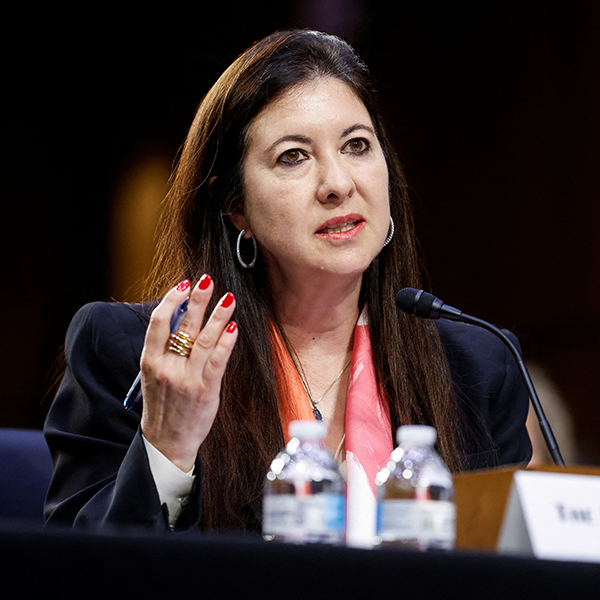When the Coalition Avenir Québec government first came to power in 2018, Eric Girard, BCom’89, was handed one of the top jobs in Premier François Legault’s cabinet as Quebec’s finance minister.
He held on to that position after a post-election cabinet shuffle following the CAQ’s re-election last year, but he was also given additional responsibilities as the government’s new minister responsible for relations with English-speaking Quebecers.
“All my education and work experience has led me to be where I am today,” says Girard. “I’m really happy both from a professional and personal point of view.”
After growing up in Quebec City, Girard chose to study at McGill for its honours economics and finance program and for the opportunity to improve his English. He then did a masters degree in economics at the Université du Québec à Montréal.
Girard spent 24 years working at the National Bank of Canada. “The last seven years I was the treasurer of the National Bank of Canada. It’s really these seven years that are totally relevant to the position of minister of finance.”
Managing Quebec’s finances requires “stewardship,” he says, a term in English “that we don’t have in French.”
Girard inherited public finances in “good shape,” from outgoing Liberal finance minister Carlos Leitão, BA’79, and when he leaves he wants to ensure “that public finances are in a better shape than when they were given to me.”
Delivering his budget update in December, Girard reflected the consensus that there is a 50 per cent chance of a recession in 2023.
“We have a significant slowing of the world economy,” he says now, noting that 2022 was a good year of growth but “2023 will be a sub-par growth year.”
“When you have very slow growth, if you have negative surprises, you will be in a recession,” Girard says, but he believes inflation should ease in 2023, sliding to four per cent “pretty quickly.”
His shift from banking to politics has come with some surprises, above all a different approach to compromise, a normal practice in banking, but one that can be rare in politics.
“When you have a business, you have clients, you have suppliers, you have to do compromises all the time. I was surprised how compromises are difficult sometimes to achieve in politics,” he says. “The natural state of politics is people set positions and they put a flag in the sand. They take their positions and they don’t want to change their positions.”
As a behind-the-scenes bank treasurer, Girard did not have to deal with the news media much. That is another aspect of his life that has changed.
“Surprise number two, I didn’t know that those who write articles do not write the headlines,” Girard reveals. After doing interviews with journalists, he found the resulting stories were usually “98 per cent in line with what we discussed, but sometimes the headlines are not in line with the content.”
While the CAQ was dominant in Quebec’s 2022 election, winning 90 of the National Assembly’s 125 seats, it won only two of the 27 island of Montreal ridings. While Girard, Legault and other CAQ ministers live in Montreal, they represent ridings outside the city.
Girard says the CAQ government must be inclusive and “govern for all Quebecers, those that voted for us, those that didn’t vote for us, and we know that we need to do better in reaching out, for instance, with Québécois d’expression anglaise.”
Asked what he tells cabinet colleagues about Montreal’s interests, Girard responds that the cabinet’s focus is on “the superior interests of Quebec.”
“I’m not a lobbyist, like I don’t represent the English community in cabinet,” Girard explains. “I’m responsible for making sure that the point of view of English-speaking Quebecers is considered in our analysis of the superior interests of Quebec.”
Girard brought up the cabinet decision to cancel a $100-million expansion of Dawson College, an English-language CÉGEP in downtown Montreal, a case where the superior interests of all Quebecers conflicted with the interests of English Quebecers.
“We prioritized CÉGEPs outside the island of Montreal because we had a student population growth that was so high, and on the other hand, we also prioritized McGill with the Royal Victoria project,” he says.
“I cannot change the decision with respect to Dawson,” he adds. “But certainly, if I had been there, it would have been [better] explained.”
The Dawson reversal came while the National Assembly was debating Bill 96, with the stated goal of halting the “decline of French.” Bill 96 includes a ceiling on enrolment in English CÉGEPs.
Girard says the census figures from Statistics Canada are clear. “Over the last 20 years … French is in decline in Canada, Quebec, Montreal, so the numbers are undeniable.”
Girard has been meeting with groups and individuals from the English community.
“By now I understand a few things where we can do better. I’m getting a feeling that people, that the English-speaking Quebecers, feel that they don’t belong in our project that we have in Quebec. Our project is inclusive, but it is not perceived this way.”
The main source of concern now, he says, is the belief that Bill 96 limits access to health services in English. “That obviously generates a lot of anxiety because when you need health care you want to be able to understand your diagnosis and second, we’re in a pandemic so health care access is difficult in general.
“Bill 96 does not affect health care services access,” he says. “It’s actually written in the law that Bill 96 does not change the [access to health care in English] law.”
In the New Year, he says, Health Minister Christian Dubé will present regional access plans for health care. “That will resolve this misperception between what we’re doing, what we want to do, and what some people are perceiving us as doing. And from there we can build trust and move forward.”
While the preservation of French is essential to Quebec’s future, Girard says that doesn’t mean that English doesn’t have a role to play.
“We want to build strong companies that compete at the highest level and in some circumstances dominate their area, whether it’s at the national level, or the North American level, we have world champions.
“So, to do this, English is useful and all businesses are aware of this,” he says.
As a McGill undergrad, Girard played intramural hockey. Premier Legault has handed him an unofficial role as Quebec’s “minster of hockey,” with a mandate to bring a National Hockey League team to Quebec City.
Girard has gone to New York for “frank” discussions with NHL commissioner Gary Bettman and his deputy Bill Daly who tell him the league has no plans now for expansion or for moving an existing team.
“It’s very important that we build bridges,” Girard says. “When the NHL is ready either to one day move a team or an expansion, we will be there.”
A hockey fan, Girard goes to Quebec City’s Centre Vidéotron arena to watch the Remparts of the Quebec Major Junior Hockey League. The $400-million NHL-class arena was built with funding from Quebec City and the province.
That was a good use of public money, the finance minister says. “Today it would be twice that [to build]. So, we have a great asset.
“In the interim, we have the best junior hockey team in Canada,” he adds. “We will win the Memorial Cup. You heard it here first.
“You have your headline,” he says, trying to coax this reporter to deliver the headline he would like. “We’re going to win the Memorial Cup!”


